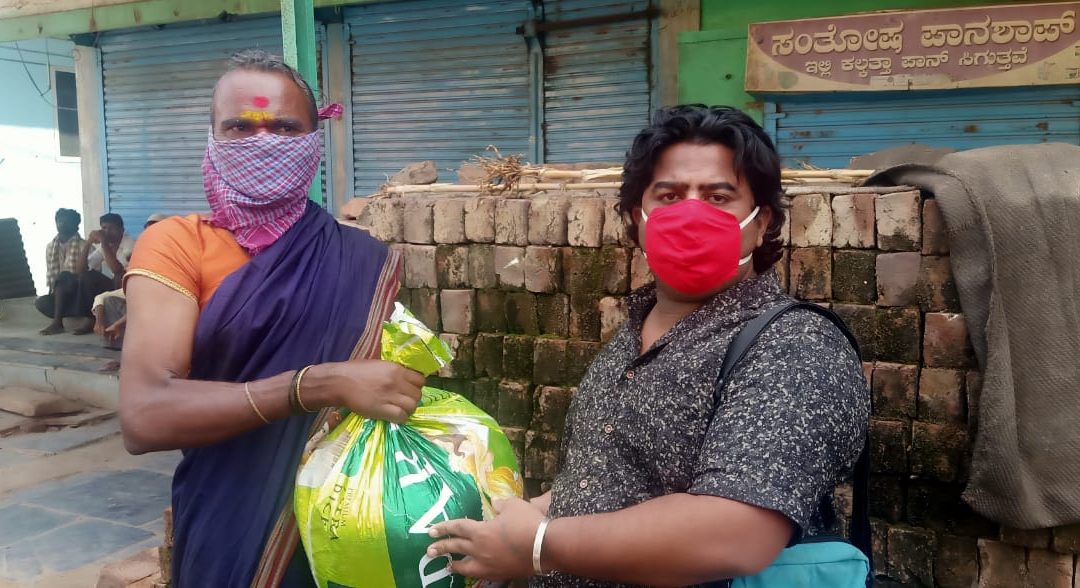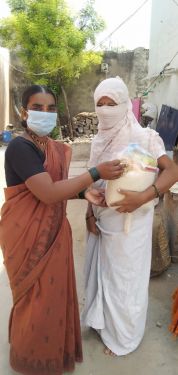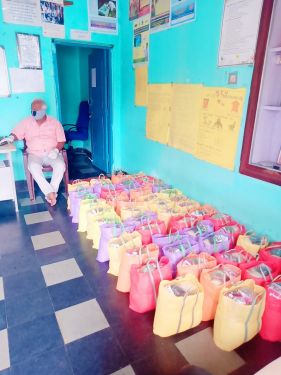This article is part of Reality of Aid – Asia Pacific’s COVID-19 Response Series, “Resisting Repression; Recovering Together”, which aims to document the struggles, best practices, and lessons learned, as well as share recommendations of RoA-AP members as they responded to the pandemic at the national or regional level. Read more stories here.
“The situation of our community is very dire because stringent restrictions have been implemented due to the number of positive COVID-19 cases in Bijapur (a district in Karnataka). I had gone to collect ART (HIV) medication to distribute to our community but the police didn’t let me. They refused to even stock ART medication for community members to come and collect. There were two people whom I tried to supply ART medication to — I was unable to reach either of them because I don’t own a government pass to travel in this lockdown, and it is very difficult to even talk to local officers here about the situation we’re facing.” – Shabbir, a transgender community leader, Bijapur district (Karnataka, India)
Shabbir’s voice is one of the many we heard during the nationwide lockdown imposed to combat COVID-19. The infectious coronavirus disease pushed countries across the world to take preventive lockdown measures in order to flatten the curve of the pandemic’s spread. However, the abruptly announced lockdown in India had disastrous consequences for millions of marginalised populations, including daily wage workers, street-based sex workers, migrant workers, gender/sexual minorities, women, craftspersons, etc. The struggle to stay afloat is still on.
As Pramod* said, “Most of us here are suffering because of the pandemic and lockdown. We used to go to work in the morning and earn Rs 200 – 500 (USD 2.67-5.67) a day, but now we’re stuck in the slums we stay in, not allowed to go outside to work. We can only run our homes if we can go out to work and earn, but for the last month or so, this lockdown has already been in force. We are told to stay at home; people who have the means to stay at home are at home and eating, but nobody is concerned about those who can’t afford to do that.”
The lockdown disproportionately affected the marginalised and the excluded across the world. Lack of access to food and other essential daily supplies, loss of livelihoods, increase in gender-based violence, etc. are some of the fallouts. The socio-economically disadvantaged sex workers and gender/sexual minorities, the communities that Solidarity Foundation work with, experienced aggravated vulnerabilities due to the existent stigma and discrimination that they face.
Many people living with HIV (PLHIV), who are more susceptible to COVID-19, couldn’t access Anti-Retroviral Therapy (ART), as Shabbir mentioned, and those on Hormone Replacement Therapy (HRT) struggled to continue treatment during the lockdown period. The lack of identification documents to access food supplies and other daily essentials (which denied them rations despite the government not mandating documents) along with a halt to seeking alms for survival, aggravated the vulnerabilities of gender/sexual minorities exponentially.
One of the sex workers we work with expressed how their livelihood has been severely hit, “We want to continue our work but as even that isn’t possible now, it is getting harder for us to survive. If this was a matter of a day or two, we’d have managed but now it’s going up to two months, how can we survive?”
For sex workers, their clients disappeared overnight. Lack of savings, non-availability of other livelihood options and difficulties in accessing social entitlements like subsidised food, put not just their livelihood but also their lives at risk. While a small percentage of sex workers with access to technology could make a switch to the virtual, those at the grassroots struggle to make ends meet (Petlee, 2020)[1].
Myths around the pandemic abound. While some are harmless, many fuel hate and prejudice — they target specific religious, or ethnic groups, or migrants. Gender/sexual minorities too have been accused of spreading the virus. Posters suggesting that transgender persons are vectors of the virus were displayed in Hyderabad’s Ameerpet Metro Station (Teja, 2020)[2]. While the posters were taken down after action by Greater Hyderabad Municipal Corporation, they reveal the deep-seated prejudice against the transgender community. Siddamma, a Jogappa (a regional transgender identity that are linked to a local goddess Yellamma), put it succintly, “Before the COVID-19 pandemic, we were invited by people to sing about Goddess Yellamma. People sought our blessings. Now they don’t want to come anywhere near us and they refuse to support us.” The peripheral space that the Jogappas occupy has further shrunk.
In our interactions with the gender/sexual minority community, the members revealed being stranded with their biological families, which led them to conceal their gender identities. This resulted in debilitating mental health concerns, with some community members attempting suicide. We were also alerted about accentuated incidents of homelessness, police harassment, intimate partner violence, stigmatisation, etc. The grassroots communities worried more about these domestic issues including dying of starvation than getting infected by the virus.
Solidarity Foundation’s immediate response to the crisis was to direct resources to the communities: we reached out to our partner community-based organisations and fellows to understand their needs to be able to provide relief. Distress calls from the community for support soared as the demand for daily supplies outstripped supply. Our pan-India, multi-lingual helpline for mental health support became a crucial intervention to deal with fear, anxiety, and concerns. For many of us who coordinated the relief work, lending an ear and shoulder was as important as providing supplies.
The government’s patchy and inadequate approach left many from the socio-economically disadvantaged sections to rely on civil society organisations for support. The efforts of various civil society organisations to band together and proactively reach relief to people in many cities in India is admirable. However, the failure of the government machinery has meant that tens of thousands have fallen with no safety net in place. Their harrowing tales point to deep systemic failures.
Now that the lockdown restrictions are easing out, the communities struggle to find livelihood, pay rent, and combat stigma and discrimination, among other problems. Solidarity Foundation aims to create small spaces for leaders of these communities to share their experiences and emotions of the struggles and anxieties of battling a pandemic and draw strength from each other as we build back — not to the “normal”, but we build back better.
*Name changed to protect identity
[1] Petlee Peter | TNN | Updated: May 27, 2. (2020, May 27). Bangalore News: Sex work goes online as new norms ban touch: Bengaluru News – Times of India. Retrieved from https://timesofindia.indiatimes.com/city/bengaluru/bengaluru-sex-work-goes-online-as-new-norms-ban-touch/articleshow/76029985.cms
[2] Teja, Charan. (2020, March 29). Miscreants put up posters in Hyderabad inciting violence against the trans community. (2020, March 29). Retrieved from https://www.thenewsminute.com/article/miscreants-put-posters-hyderabad-inciting-violence-against-trans-community-121391



